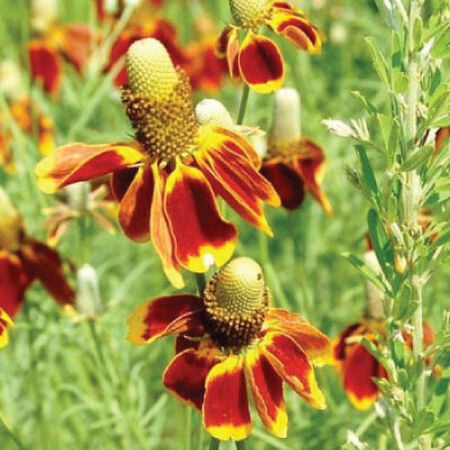Mexican Hat, Ratibida Seeds
Key Attributes
Key Attributes
Product Details
Weight
0.01Depth
0.15Height
4.5Width
3.25Plant Height
15-24"Botanical Name
Ratibida columnarisSeed Type
SeedAdditional Characteristics
Attracts Pollinators, Attracts Birds, Extended BloomsSeeds Per Gram
2,713Seeds Per Pound
1,230,000Packet
500 SeedsSow Depth
1/8"Seeds Per Ounce
76,875Breed
Open-pollinatedSun
Full SunLife Cycle
PerennialSow Method
TransplantCategories
FlowersDays To Maturity (# Days)
70-90Components
Growing Instructions
![]() Learning Download: How to Grow Ratibida
Learning Download: How to Grow Ratibida
Ratibida is a perennial native to many parts of North America and is closely related to Rudbeckia. Ratibida can reach 60 inches in height and blooms with petals drooping downward and has dark green foliage.
Before Planting: Ratibida can be directly sown or started indoors. If started indoors, seeds require vernalization, which is wrapping planted pots in plastic and then placing them in the refrigerator for a week.
Planting: Direct sow seeds in May or early June. Space them 12 to 24 inches apart in the garden.
Watering: When watering, avoid getting water on the leaves of the plant.
Fertilizer: Ratibida doesn’t require a lot of fertilizer and one dose in the fall months should be enough for the plant.
Days to Maturity: Ratibida will bloom from mid-summer to fall.
Harvesting: If keeping Ratibida in a vase, snip the leaves off the stem to prevent mildew.
Tips: Ratibida can be susceptible to powdery and downy mildew, fungal spots and leaf smut. To prevent this, mulch around the plants and only water in the mornings.
Shipping Schedule
Our Seed Promise
 "Agriculture and seeds" provide the basis upon which our lives depend. We must protect this foundation as a safe and genetically stable source for future generations. For the benefit of all farmers, gardeners and consumers who want an alternative, we pledge that we do not knowingly buy or sell genetically engineered seeds or plants.
"Agriculture and seeds" provide the basis upon which our lives depend. We must protect this foundation as a safe and genetically stable source for future generations. For the benefit of all farmers, gardeners and consumers who want an alternative, we pledge that we do not knowingly buy or sell genetically engineered seeds or plants.
The mechanical transfer of genetic material outside of natural reproductive methods and between genera, families or kingdoms, poses great biological risks as well as economic, political, and cultural threats. We feel that genetically engineered varieties have been insufficiently tested prior to public release. More research and testing is necessary to further assess the potential risks of genetically engineered seeds. Further, we wish to support agricultural progress that leads to healthier soils, to genetically diverse agricultural ecosystems, and ultimately to healthy people and communities.
To learn more about the "Safe Seed Pledge" please visit www.councilforresponsiblegenetics.org.

